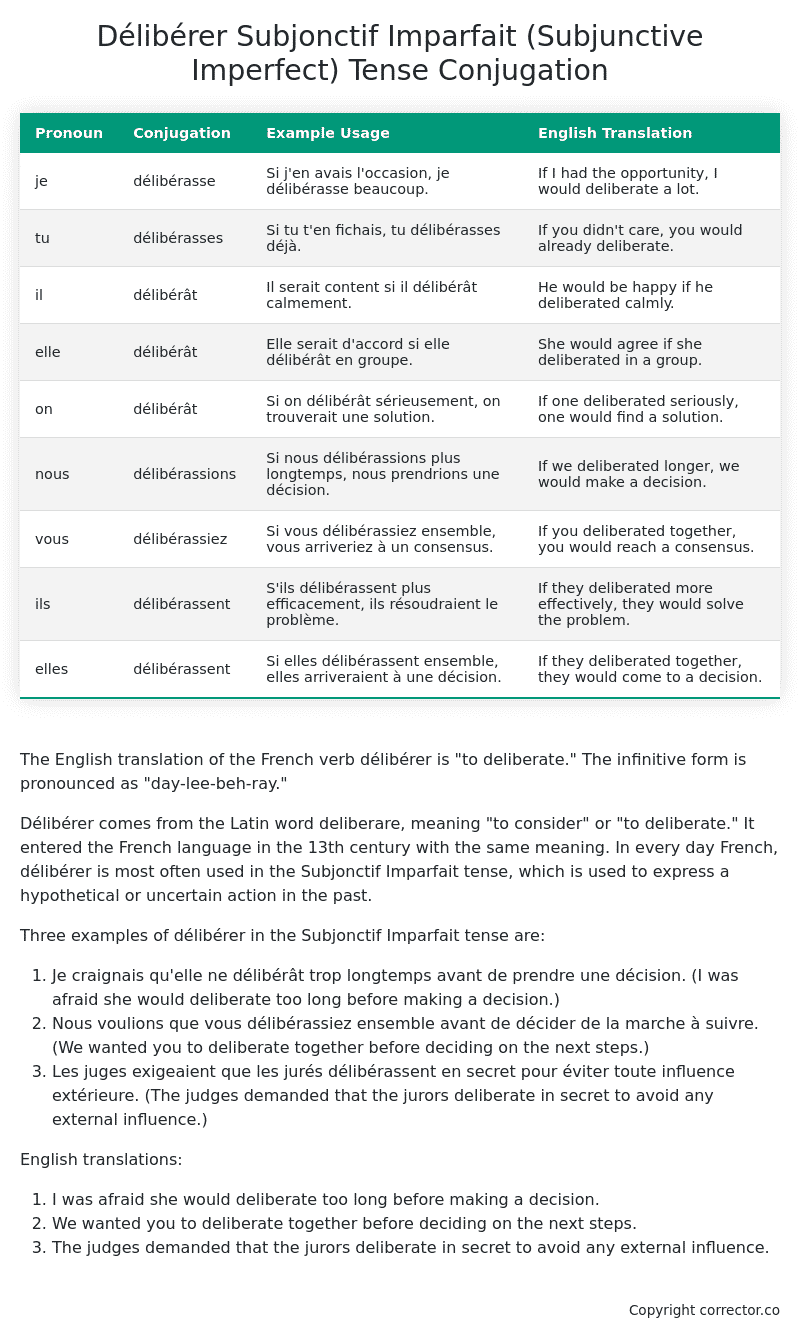Subjonctif Imparfait (Subjunctive Imperfect) Tense Conjugation of the French Verb délibérer
Introduction to the verb délibérer
The English translation of the French verb délibérer is “to deliberate.” The infinitive form is pronounced as “day-lee-beh-ray.”
Délibérer comes from the Latin word deliberare, meaning “to consider” or “to deliberate.” It entered the French language in the 13th century with the same meaning. In every day French, délibérer is most often used in the Subjonctif Imparfait tense, which is used to express a hypothetical or uncertain action in the past.
Three examples of délibérer in the Subjonctif Imparfait tense are:
- Je craignais qu’elle ne délibérât trop longtemps avant de prendre une décision. (I was afraid she would deliberate too long before making a decision.)
- Nous voulions que vous délibérassiez ensemble avant de décider de la marche à suivre. (We wanted you to deliberate together before deciding on the next steps.)
- Les juges exigeaient que les jurés délibérassent en secret pour éviter toute influence extérieure. (The judges demanded that the jurors deliberate in secret to avoid any external influence.)
English translations:
- I was afraid she would deliberate too long before making a decision.
- We wanted you to deliberate together before deciding on the next steps.
- The judges demanded that the jurors deliberate in secret to avoid any external influence.
Table of the Subjonctif Imparfait (Subjunctive Imperfect) Tense Conjugation of délibérer
| Pronoun | Conjugation | Example Usage | English Translation |
|---|---|---|---|
| je | délibérasse | Si j’en avais l’occasion, je délibérasse beaucoup. | If I had the opportunity, I would deliberate a lot. |
| tu | délibérasses | Si tu t’en fichais, tu délibérasses déjà. | If you didn’t care, you would already deliberate. |
| il | délibérât | Il serait content si il délibérât calmement. | He would be happy if he deliberated calmly. |
| elle | délibérât | Elle serait d’accord si elle délibérât en groupe. | She would agree if she deliberated in a group. |
| on | délibérât | Si on délibérât sérieusement, on trouverait une solution. | If one deliberated seriously, one would find a solution. |
| nous | délibérassions | Si nous délibérassions plus longtemps, nous prendrions une décision. | If we deliberated longer, we would make a decision. |
| vous | délibérassiez | Si vous délibérassiez ensemble, vous arriveriez à un consensus. | If you deliberated together, you would reach a consensus. |
| ils | délibérassent | S’ils délibérassent plus efficacement, ils résoudraient le problème. | If they deliberated more effectively, they would solve the problem. |
| elles | délibérassent | Si elles délibérassent ensemble, elles arriveraient à une décision. | If they deliberated together, they would come to a decision. |
Other Conjugations for Délibérer.
Le Present (Present Tense) Conjugation of the French Verb délibérer
Imparfait (Imperfect) Tense Conjugation of the French Verb délibérer
Passé Simple (Simple Past) Tense Conjugation of the French Verb délibérer
Passé Composé (Present Perfect) Tense Conjugation of the French Verb délibérer
Futur Simple (Simple Future) Tense Conjugation of the French Verb délibérer
Futur Proche (Near Future) Tense Conjugation of the French Verb délibérer
Plus-que-parfait (Pluperfect) Tense Conjugation of the French Verb délibérer
Passé Antérieur (Past Anterior) Tense Conjugation of the French Verb délibérer
Futur Antérieur (Future Anterior) Tense Conjugation of the French Verb délibérer
Subjonctif Présent (Subjunctive Present) Tense Conjugation of the French Verb délibérer
Subjonctif Passé (Subjunctive Past) Tense Conjugation of the French Verb délibérer
Subjonctif Imparfait (Subjunctive Imperfect) Tense Conjugation of the French Verb délibérer (this article)
Subjonctif Plus-que-parfait (Subjunctive Pluperfect) Tense Conjugation of the French Verb délibérer
Conditionnel Présent (Conditional Present) Tense Conjugation of the French Verb délibérer
Conditionnel Passé (Conditional Past) Tense Conjugation of the French Verb délibérer
L’impératif Présent (Imperative Present) Tense Conjugation of the French Verb délibérer
L’infinitif Présent (Infinitive Present) Tense Conjugation of the French Verb délibérer
Struggling with French verbs or the language in general? Why not use our free French Grammar Checker – no registration required!
Get a FREE Download Study Sheet of this Conjugation 🔥
Simply right click the image below, click “save image” and get your free reference for the délibérer Subjonctif Imparfait tense conjugation!

Délibérer – About the French Subjonctif Imparfait (Subjunctive Imperfect) Tense
Formation
Common Everyday Usage Patterns
Interactions with Other Tenses
Subjonctif Présent
Indicatif Passé Composé
Conditional
Conditional Perfect
Summary
I hope you enjoyed this article on the verb délibérer. Still in a learning mood? Check out another TOTALLY random French verb conjugation!


